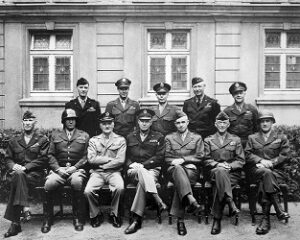 . . but planning is everything.
. . but planning is everything.
This saying is attributed to Dwight D. Eisenhower, and to be honest it didn’t make sense to me at first. Plans almost always go awry in some way, but that’s not the same as saying that plans are useless.
Substitute the word “preparation” for “planning” and the meaning becomes much clearer. I was reminded as I worked on this post of a talk I heard many years ago at an educational conference by Dr. Jerry Tetreau. He was speaking about the importance of being prepared to teach, using the Latin word praeparō, meaning “to make ready in advance.” If you’re prepared, then a change in plans won’t throw you. And there are always changes in plans, no matter how well thought out they may be.
Back in the mid-1970’s I saw a great illustration of this principle. A fellow graduate student was doing her speech recital, a dramatic presentation on Catherine Booth, the wife of William F. Booth, the founder of the Salvation Army. There she was, up on stage all by herself, costumed in a cape and hat, when suddenly something started flying around the stage. She kept going. Eventually, I think, the critter disappeared, but she never missed a beat, and she finished the recital to great applause. Know what it was? A bat. How would you ever plan for such a thing? The truth is, you wouldn’t. You couldn’t. You could only prepare.
 I wrote last week about John Piper’s book Desiring God and said that I had just started reading it and was excited about its ideas. I’ve been chewing over it–a better description than “reading it”–and realizing more and more how much it would have helped me back when I was a college student and struggling with the question of what God wanted me to do with my life. But hey–I’m still struggling with that question. So it’s still helpful.
I wrote last week about John Piper’s book Desiring God and said that I had just started reading it and was excited about its ideas. I’ve been chewing over it–a better description than “reading it”–and realizing more and more how much it would have helped me back when I was a college student and struggling with the question of what God wanted me to do with my life. But hey–I’m still struggling with that question. So it’s still helpful.
 I wrote last week about John Piper’s book Desiring God and said that I had just started reading it and was excited about its ideas. I’ve been chewing over it–a better description than “reading it”–and realizing more and more how much it would have helped me back when I was a college student and struggling with the question of what God wanted me to do with my life. But hey–I’m still struggling with that question. So it’s still helpful.
I wrote last week about John Piper’s book Desiring God and said that I had just started reading it and was excited about its ideas. I’ve been chewing over it–a better description than “reading it”–and realizing more and more how much it would have helped me back when I was a college student and struggling with the question of what God wanted me to do with my life. But hey–I’m still struggling with that question. So it’s still helpful.

 Are you a fan of the PBS TV show “
Are you a fan of the PBS TV show “
 I’m concentrating right now on building happiness by establishing good habits within the limits of my character. This emphasis has grown out of Gretchen Rubin’s new book that I wrote about yesterday. I’ve been sharing my struggles to put accountability structures in place that will work with my obliger tendency, but I’m realizing that for some habits I’m just going to have to use some other prod or prods. I’ll be writing about these ideas over the next posts. I love putting my mind to a problem and finding a solution once I realize that there is a problem.
I’m concentrating right now on building happiness by establishing good habits within the limits of my character. This emphasis has grown out of Gretchen Rubin’s new book that I wrote about yesterday. I’ve been sharing my struggles to put accountability structures in place that will work with my obliger tendency, but I’m realizing that for some habits I’m just going to have to use some other prod or prods. I’ll be writing about these ideas over the next posts. I love putting my mind to a problem and finding a solution once I realize that there is a problem. . . but planning is everything.
. . but planning is everything. . . . on the importance of small things!
. . . on the importance of small things!
 . . . you have to take the stairs!
. . . you have to take the stairs! . . . is myself.
. . . is myself.